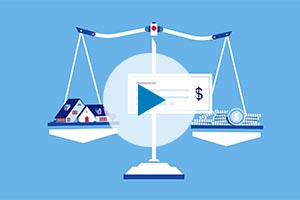
Tips for realtors to help clients get their homeownership goals back on track

Mortgage basics: How much house can you afford?

If you’re new to the homebuying process it can be hard to know where to start. What kind of income do you really need to qualify for a mortgage? What are the steps involved? How do you separate fact from fiction? We’re here to help dispel some mortgage myths and set you up for success.
Contrary to what you might believe, your mortgage interest rate may not be the most important factor. There are plenty of numbers that go into your monthly mortgage amount and an interest rate is only one piece of the puzzle. Depending on the price of the house a small difference in mortgage interest rates could be manageable. For a home priced at $350k, for instance, you could be looking at a payment difference of $12 to $25 per month for every .125% increase in the interest rate. But note that these amounts do add up over the life of the loan.
Two other crucial factors are the size of the loan you plan to take out and how quickly you want to pay it off. Your costs will be greater the less money you put towards a down payment and the longer your loan term. Other factors that can impact your monthly mortgage payment include private mortgage insurance, property taxes, homeowner’s insurance and association fees.
It’s true that the down payment can be one of the biggest hurdles aspiring homeowners face. It can be an even bigger hurdle if you work in a job that doesn’t have a consistent pay schedule. This is why you want to start saving as soon as possible.
Start saving what you can each month. For example, if you deposit $250 each month for twelve months into a savings account you will have saved up to $3,000 for a future down payment. Or deposit the difference between your current housing expense and your ideal future monthly mortgage payment. That way you can start building the cushion you need while getting used to the monthly expense.
Most lenders want to know that you’ve got a steady income when considering whether to approve you for a mortgage. But what if you have the kind of job where your income ebbs and flows from month to month? You’re not alone, lots of people are in this category including gig workers, small business owners, contract workers and people who do seasonal work. Don’t worry, buying a home can still be in reach for you. One strategy is to save for a larger down payment which can help you during the approval process. You might also build your savings or have additional income sources as a backup plan in case your income from your primary work drops unexpectedly.
Now that you know the basics, it’s time to put your plan into action.
From the spark of an idea to the moment you turn the key to your new home, here’s how to go about getting a mortgage:
Don’t think you have to figure this all out on your own, either. Your mortgage loan officer can be your guide throughout the entire process, giving you options for real estate agents, builders, home inspectors and homeowner’s insurance agents.
Be sure to take full advantage of their experience. They can let you know which loans to consider, how to structure them and how much of a down payment you'll need. Above all else, don’t rule out a house you might want to buy before consulting with your mortgage loan officer.
If you’re ready to learn more about mortgages, we're here to help. Reach out to a mortgage loan officer to discuss your situation over the phone, via email or within a branch.
Related content


